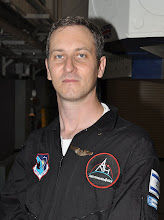 |
| Lunch with SwRI and Dr. Stanley Love (sipping tea) |
Stan was presented by Dr. William (Bill) F. Bottke from SwRI. Having known Stan for about fifteen years, Bill warmly talked about Stan and his background, from his PhD at the University of Washington and his work researching micrometeorite flux, up to his selection as an astronaut candidate in 1998 and his flight on STS-122. Bill also told us about how Stan convinced Sarah Stewart to work with Tom Ahrens, ultimately leading to her receiving the 2009 Urey Prize, and about him being a Japanese Anime fan.
As I get to meet and talk with astronauts (Sam Gemar at KSC, Yvonne Cagle at NSRC) I realize more and more how on top of their quantifiable achievements they are really friendly and outgoing people, and Stan is no exception. Narrating a twenty minute video, he told us some of the ins and outs of STS-122 on February 2008. Some of the video footage was pretty standard as far as NASA missions go, but the narrative and small details Stan added made a huge difference compared to watching NASA TV.
STS-122 brought the ESA Columbus laboratory module to the ISS on board of the Atlantis space shuttle, so the patch has a Columbus theme to it (patches are designed or at least heavily influenced by the mission crew). Stan was most serious when he talked about all the precautions and procedures put in place since the Columbia disaster, showing us the several methods to make sure no damage to the shuttle heat shield was done during takeoff.
 |
| M. C. Escher - Relativity |
The rest of the talk, he peppered what he said with little jokes and some small but cool details (at least for us who never got more than an airliner altitude away from Earth). For example, he told us about how to recognize the newcomers to the ISS versus the old timers - the former are rigidly heads up for no good reason other than matching all the simulations and avoiding odd angles to prevent nausea. The station residents hang out in the corners in what reminded me of an Escher painting such as the one on the right.
It was very interesting to hear how after meticulous planning, training and simulations Stan filled in for Hans Schlegel on the first EVA because he got sick. "When you're outside in a space-suit your IQ drops by about a factor of 12", Stan joked, referring to the necessity to have instructions covering the entire EVA coming from a person inside the station. He continued by telling a military jet pilot joke about the IQ being divided by the Mach factor (the number of times the speed of sound the aircraft is flying at), which in case of the ISS that factor is 25...
"The Earth is the most interesting thing in space", Stan noted, as he explained that what astronauts like to do most when they have a spare moment is to look at the Earth. Later, he described the moon as looking small and dirty compared to Earth - the day lit moon is gray and reflects less light than the bigger (especially at low orbit) and colorful Earth.
Another interesting insider detail was how Stan prepared his crew mates for landing (suits, helmets, strapping) and didn't get the chance to put on his own boots in time, so when Atlantis went through the deorbit burn, his boots drifted to the back of the cabin. His boots weren't the only item that didn't get all its planned use - he also brought chocolate covered coffee beans which he didn't eat out of fear they would interfere with his sleep, critical to the success of the mission.
During Q&A I thought of broadcast 1295 of The Space Show with Dr. Charles Bourland (a show revolving around astronaut food). I asked whether the rumors about alchohol being brought onto the space station by Russian cosmonauts were true. As a true representative of a federal agency Stan replied "Officially there is no alchohol on the space station" and continued - "I did not see any alchohol while I was up there. I know of no American who will admit to seeing any alchohol".
After the fascinating talk I got a tour of the Boulder office, which seems more like a startup company than an office of a large company (and I mean that in a good way), and I got invited to join Stan and several SwRI employees for lunch at an Indian restaurant, where conversation about a number of space related issues continued. Suffice it to say that I enjoyed this short time amongst researchers, an astronaut and space topics. This was my first time attending one of the SwRI Boulder Colloquia, which occur about once a week and revolve around space - science, missions, technology and findings. These meetings are free, open to the general public and I highly recommend attending - I know I'll come back for more.


 Space Shuttle Launch Poll Results
Space Shuttle Launch Poll Results













1 comment:
Great post. Two of the upcoming SwRI colloquium speakers went to grad school with me at WashU: Steve Hauck and Channon Visscher.
Post a Comment